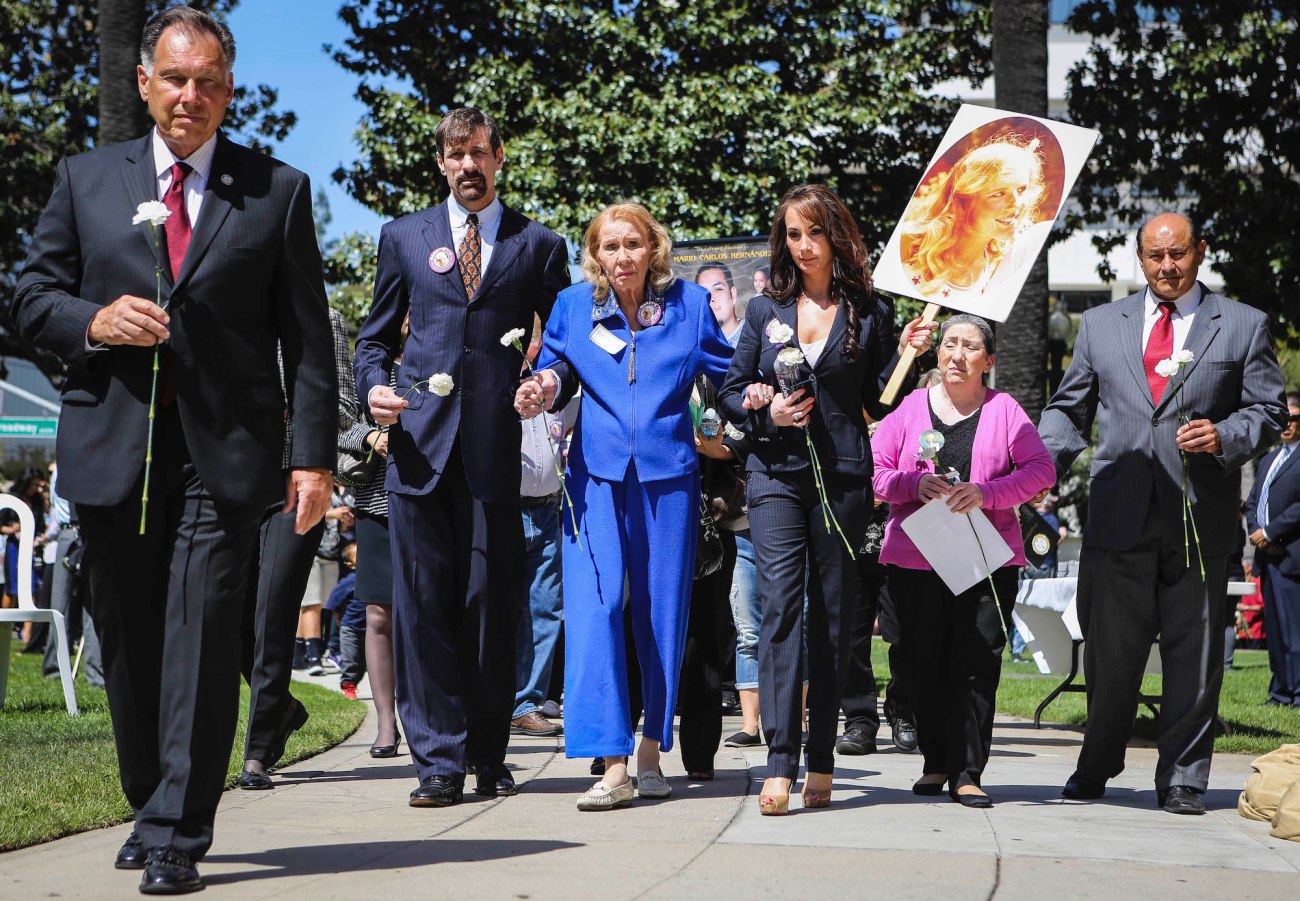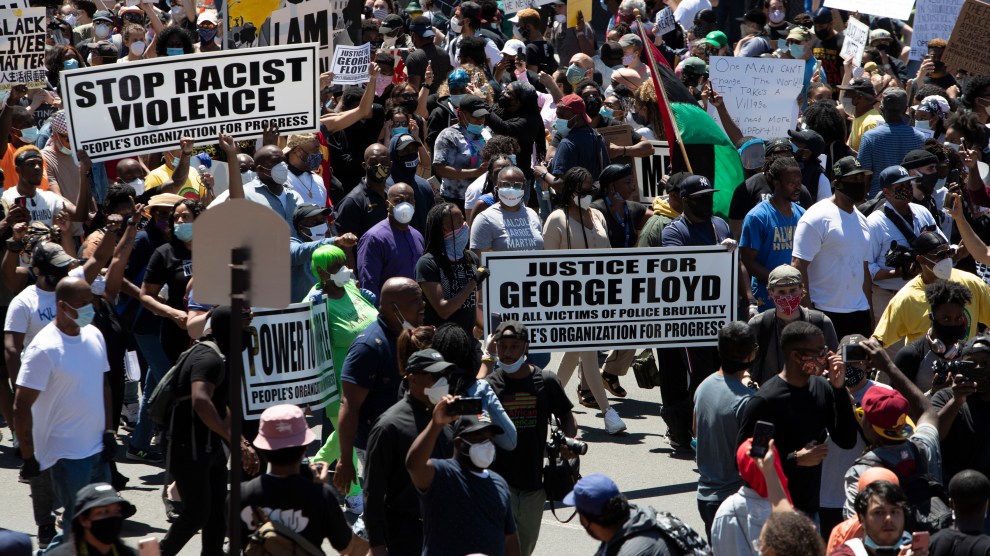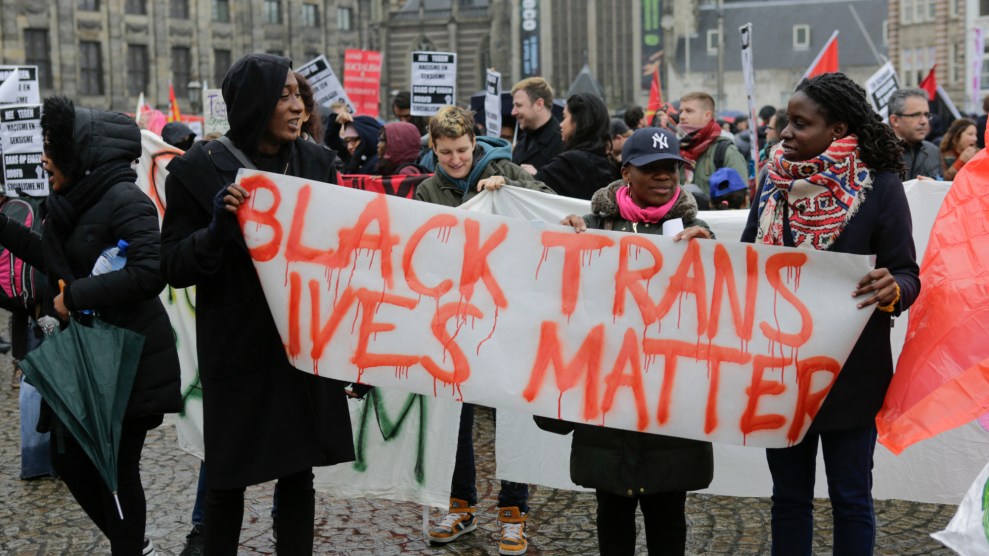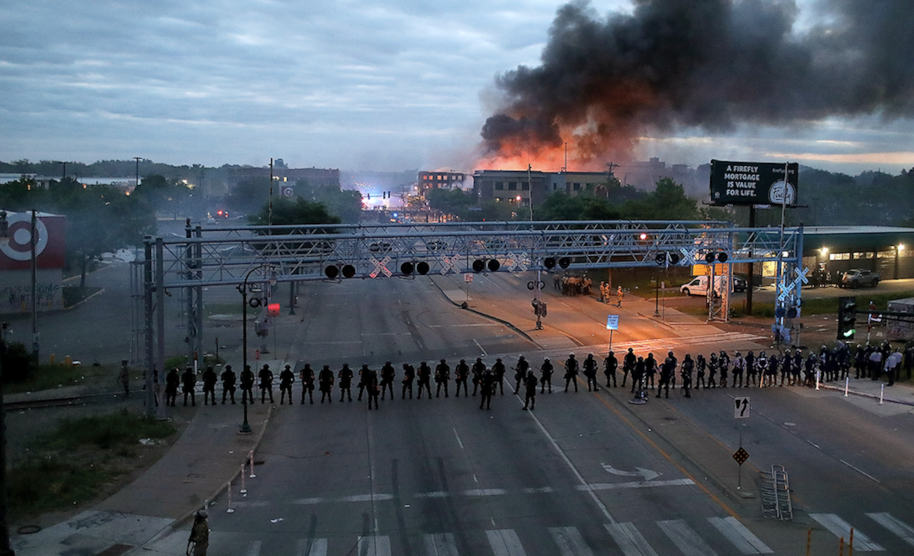The shooting death of Tony McDade followed a painfully familiar formula. On the morning of May 27, two days after George Floyd’s life was stamped out under the knee of Minneapolis police officer Derek Chauvin, Tallahassee police responded to a report of a fatal stabbing on a residential street on the south side of town. McDade, a Black transgender man, was identified as a suspect. When an officer chased after him, McDade pulled a gun and “made a move consistent with using the firearm against the officer,” according to a statement from police. The cop pulled the trigger. Witnesses claim the officer, who they say is white, never attempted to deescalate the encounter before resorting to lethal force.
It was after the shooting that things got peculiar. Unlike Chauvin, Darren Wilson (the Ferguson police officer who killed Michael Brown in 2014), Daniel Pantaleo (the NYPD officer who killed Eric Garner that same year) and countless others, the identity of the officer who shot McDade has been kept a secret. The Tallahassee Police Department says he is the victim of a crime—the alleged attempt by McDade to shoot him—and his identity should therefore be protected. Thanks to a victims’-rights amendment added to Florida’s constitution in 2018, the police say, the officer who killed McDade has a right to privacy.
McDade “ambushed” the officer, the Florida Police Benevolent Association said in an injunction to keep the officer’s identity under wraps. Immediately after the shooting, the association said, “he was threatened by persons who were on the scene, and there has been ongoing animosity expressed against him on social media since he was forced to defend his own life.”
The motion continued: “His fear for his safety is reasonable, especially given the current unrest that has followed in the wake of George Floyd’s death in Minneapolis. As such, one cannot reasonably question [John] Doe’s fear that the release of his personal information will give rise to potential harassment of him and/or his family.”
Critics of the police response, who include LGBTQ advocates, local and national press, and First Amendment groups, argue that they are misapplying the law—known as Marsy’s Law—to protect themselves from increased scrutiny. Even the city is skeptical of the victimhood claim.
In response to the injunction, the city’s attorney explained that law enforcement has a lower expectation of privacy than regular citizens while on duty, and “an officer’s ability to avoid public scrutiny and accountability by claiming confidentiality under Marsy’s Law is directly contradictory to the public’s First Amendment ‘right to gather information about what public officials do on public property.'”
Now, with frustrations about police brutality boiling over in Tallahassee, as well as the rest of the country, the PBA has vowed to “exhaust every legal resource” to keep the officer’s name from getting out.
Transparency and police accountability go hand in hand. Video of Rodney King being brutally beaten by police in 1991 helped spur the officers’ arrest. The Black Lives Matter Movement rapidly rose to national prominence after a cellphone video of Garner being choked to death by NYPD was made public. Reporting on Chauvin’s record of brutality in Minneapolis contributed to the fury over how easy it is for cops to get away with violence. Making body camera footage and use-of-force data available to the public has become a pillar of modern police reform.
Of course, the Trump administration has done its best to roll back police accountability measures. The administration has been unwilling to investigate police departments, and in 2018, Attorney General Jeff Sessions gutted the federal government’s ability to enter into and enforce consent decrees—contracts that give Department of Justice watchdogs strict oversight of ailing police departments. Without any kind of federal control, attempts by police to shield themselves behind vague privacy claims and public records exemptions deserve more scrutiny now than ever.

Dr. Henry T. Nicholas III and his mother, Marcella Leach, at the Orange County Victims’ Rights March and Rally in 2013, in Santa Ana, Calif.
Bret Hartman/AP Images for Marsy’s Law For All
Marsy’s Law is the Tallahassee PD’s way of protecting the officer who shot McDade. But the law is is not unique to Florida. Ten other states—California, Georgia, Illinois, Nevada, North Dakota, North Carolina, Ohio, Oklahoma, South Dakota, and Wisconsin—all have Marsy’s Law, otherwise known as the “victims’ bill of rights,” on the books, guaranteeing that victims are notified of (and allowed to attend) criminal proceedings related to their case, given the opportunity to submit victim impact statements, and offered privacy and “reasonable protection” from the defendant, among other things.
It’s named for Marsalee “Marsy” Nicholas, who was stalked and killed by her ex-boyfriend in 1983. The perpetrator was speedily arrested, but he just as quickly made bond. Marsy’s family bumped into him at the supermarket on their way home from her funeral. No one had notified them of his release.
The encounter infuriated Marsy’s brother, Henry Nicholas. In the years that followed, Nicholas made billions as the co-founder of Broadcom, the company that makes the semiconductors for iPhones and other smartphones. He began supporting the growing movement to get additional rights for crime victims codified into law and opposing criminal justice reforms that offered relief to offenders. In 2004, Nicholas funneled $3.5 million into the campaign to defeat California’s Proposition 66, which sought to limit the state’s “three strikes law.” In 2008, he shifted his focus to bankrolling the campaign to get California to adopt a victims’ bill of rights.
The next year, Marsy’s Law for All was born. Since then, Nicholas has poured nearly $100 million into campaigns to enact Marsy’s Law across the country. According to Marsy’s Law for All, approximately one third of Americans live in states with Marsy’s Law protections.
Efforts to pass Marsy’s Law centered on the idea of letting the family of victims be more involved in the criminal justice process—that police officers have started using it is just one of the law’s several unintended consequences.
“It certainly is alarming in light of what’s going on now,” said Cynthia Roseberry, the deputy director of policy for the ACLU’s Justice Division. “Had it not been for this video in Minneapolis, the narrative created by the officer would have stood—he said [Floyd] was resisting arrest. And that narrative is what could trigger that Marsy’s Law protection.” (Minnesota has not yet adopted a Marsy’s Law amendment.)
Marsy’s Law and the victims’ rights movement more broadly exist in some tension with the growing efforts to overhaul the criminal justice system. That a law designed for victims might be used for reactionary ends isn’t as strange as it might seem. The victims’ rights movement was the child of 1970s-era radical feminism and of the backlash to the Warren Court, which in the 1960s had dramatically expanded the rights of defendants. A language of therapy and social justice was wedded to a lock-’em-up approach to crime. Today, in the name of victims’ rights, prosecutors may push for harsher sentences; juries may be less likely to consider exculpatory evidence; and victims (or their families) may advocate against the defendant being released on parole. The underlying assumption is that justice for victims almost always means arrest and incarceration for the accused.
Things may be changing. “Actually, a lot of victim rights groups are now filled with people who are talking in very different ways about criminal punishment,” said Mariame Kaba, the director of Project NIA and an outspoken prison abolitionist, in a 2019 interview with MSNBC’s Chris Hayes. “This is true in New York State where people are now saying things like: ‘We don’t want to be locking everybody up. This is not the way we’re going to solve it.’ Because guess what, they’ve had years of seeing how that policy’s actually not worked for anybody in a good way.”
Nonetheless, Marsy’s Law continues to make it on ballots across the country, including in Wisconsin, where it was overwhelmingly approved by voters in the state’s April primary.
Critics, who range from defense attorneys to the ACLU and the Cato Institute, have been concerned about Marsy’s Law from the beginning. They say the laws are overly broad, inherently punitive, and constitute a due process violation for the accused. For example, maintaining a victim’s privacy can limit a defense attorney’s ability to gather evidence to build their case.
“While considerate treatment of victims is important,” Cato Institute fellow Walter Olson wrote last year, “it is dangerous to let the conduct and timing of criminal process itself depend too much on their wishes….The function of criminal prosecution cannot be to validate the victim’s suffering. It must instead be to ascertain the truth as best as possible and impartially carry out the legal consequences on the guilty.”
In a legal memo challenging the constitutionality of Marsy’s Law in Illinois, prominent Chicago defense attorney Andrea Lyon writes: “When the victim’s state constitutional rights conflict with a defendant’s federal constitutional rights to due process and effective cross-examination, the alleged victim’s rights must yield.”
Lyon told me that when police invoke Marsy’s Law, it tips the scales of justice even further to the disadvantage of a defendant. In her more-than-40-year career Lyon has defended hundreds of clients, including some who have survived police shootings, only to be charged with attempted murder of an officer. “It’s really quite common,” she said. When police claim victimhood, it makes it incredibly difficult for the defendant to claim self-defense. And without access to an officer’s personnel reports, it’s almost impossible to prove a pattern of brutality—it becomes a defendant’s word against law enforcement’s. And who do people usually believe?
“Your client—who most often is not a white person, not a person of privilege, not someone that your jury identifies with—all he’s left to say is, ‘He started it,'” Lyon said. “And here’s the officer saying, ‘No, I didn’t.'”
And while no one I talked to said cops should never be considered victims, allowing officers who use lethal force on duty to claim the same privacy rights as private citizens sets a dangerous precedent.
Comprehensive data on how often police have used Marsy’s Law is almost nonexistent. In Florida, a recent investigation from the Tampa Bay Times found a mixed bag when it comes to classifying cops as victims. Some agencies, such as the Pasco County Sheriff’s Office in central Florida, automatically apply Marsy’s Law to on-duty officers who use force in response to violence from a suspect. The St. Petersburg Police Department only withholds officer’s name at their request. The sheriff in Pinellas County (which includes St. Petersburg) told the Times he doesn’t apply Marsy’s Law to his deputies because “this is what we do. If you don’t want to be transparent, if you don’t want to be forthright, then don’t sign up for the job.”
In Tallahassee, officers have been involved in three civilian deaths since March, including McDade’s. Only one officer has been identified.
Officers in the Dakotas have also shielded themselves with victims’ rights. According to a 2018 investigation by the Grand Forks Herald, since North Dakota enacted Marsy’s Law in 2016, there had been at least eight police shootings in the state. In almost all of them, police claimed victimhood and invoked their right to keep under wraps “information or records that could be used to locate or harass a victim or the victim’s family”—including their names and prior disciplinary reports—until the investigation into the shooting was complete. Multiple law enforcement officers in South Dakota have also invoked Marsy’s Law to keep their identities confidential, including the Pennington County sheriff’s deputy who shot and killed a fleeing suspect in November 2018.
In Illinois, Lyon told me, law enforcement has never invoked Marsy’s Law on behalf of an officer. Neither have police officers in California, thanks at least in part to a 2014 state Supreme Court ruling that declared the names of officers involved in on-duty shootings to be public record. (Though the case was not based on a Marsy’s Law challenge.) Garrett Rolfe, the Atlanta police officer who fatally shot Rayshard Brooks on June 12, also has not claimed victim’s rights.
Though the laws are relatively new, the strategy is one of the oldest in the policing handbook. By obfuscating public information, police officers have literally gotten away with murder.
“Failure to hold police accountable, by not investigating the cases, not prosecuting the cases and by granting qualified immunity in addition to vilifying the deceased, are evidence of a longstanding tradition, an agreement if you will,” Roseberry said. “Invoke the magic word ‘victim’ and you can kill at will.”
Saturday, June 6, was a rainy day in Florida’s capital. A few hours after McDade’s family said their final goodbyes at a graveside service, the city’s top brass met with several hundred police officers in the parking garage outside City Hall to discuss releasing the name of the officer who shot McDade. In the previous 10 days, the city government had been flooded with public records requests to release the name or other material that could shed light on the incident, like body camera footage for the handful of officers who were either there or responded to the scene.
“There are all types of stories going on as far as what happened, and what didn’t happen, and what he had or what he didn’t have,” Mutaqee Akbar, the McDade family’s attorney, told Tallahassee’s local ABC affiliate station. “What’s most important is this law enforcement officer is still on the streets. If [the video] shows that that law enforcement officer did something that was inappropriate we need to know right away whether he should still be on the streets or even on office duty.”
Days before the parking garage rendezvous, a Leon County judge had denied the PBA’s request to block the release of the officer’s identity, without ruling on the constitutionality of Marsy’s Law. At the meeting on June 6, the city signaled that it would publish the name soon. Frustrated, about 100 officers stormed out.
City leadership capitulated, agreeing to hold off while the PBA continued to fight it in court. In their renewed petition to the court, the organization restates their belief that Marsy’s Law should apply to law enforcement, and argues that such a position is only controversial because of the protests against police brutality that are raging across the country.
In a prior police shooting, which took place a week before McDade’s death, the city “interpreted Marsy’s Law as applying to law enforcement officers who become a victim of crime while serving in their official capacity,” the PBA wrote. “[B]ut in the wake of the killing of George Floyd, the City has reversed its position on the applicability to police officers.”
The court is expected to make a final ruling soon. In the meantime, a conglomerate of media organizations—including the Florida Press Association, the Miami Herald, and the New York Times—have filed a motion demanding the release of the officer’s name. The local organization behind Marsy’s Law in Florida has so far been hesitant to weigh in.
“Police officers who have become victims of crime deserve the same constitutional rights as everyone else,” a spokesperson told Mother Jones in an emailed statement. “But police officers who have committed crimes cannot hide behind Marsy’s Law….The Marsy’s Law provision of the constitution is clear when it says that the accused cannot also be a victim.”
Though the circumstances surrounding McDade’s death are still unclear, numerous organizations, including the ACLU of Florida, Human Rights Campaign, and the National Black Justice Coalition, have called for a full investigation into the shooting. That starts by releasing the name of the officer.
“We don’t know a lot of the details around Tony’s death, or how police became involved. We do know that Tony should not have been killed,” said NBJC executive director David J. Johns in a statement. “We must also work to ensure that police officers understand they do not have a license to kill Black people, period.
“The world is watching.”
This article has been updated to reflect changes to the Mother Jones style guide.








